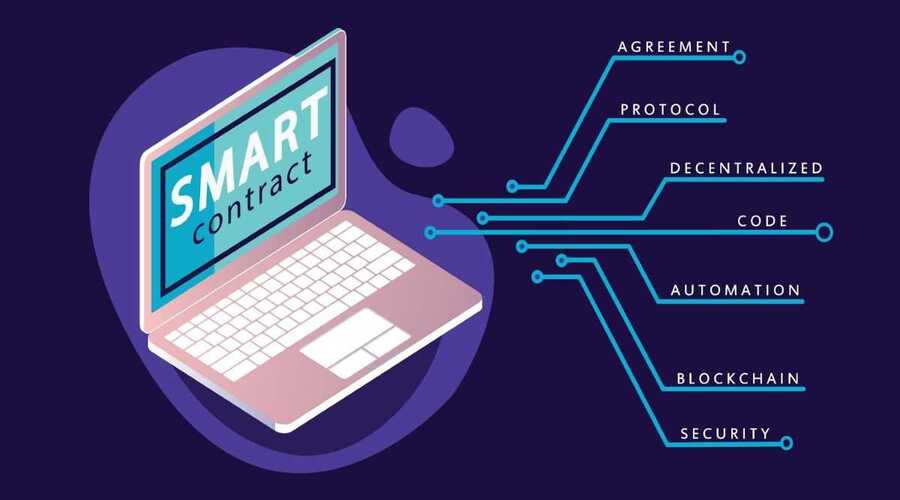Smart contracts have revolutionized the way business transactions are conducted, offering a secure, efficient, and cost-effective alternative to traditional contract management. In this article, we will explore how organizations can improve their efficiency and achieve significant cost savings through the adoption of smart contracts.
Introduction
In today’s fast-paced digital landscape, businesses are constantly seeking ways to enhance their operational efficiency while reducing costs. Smart contracts, powered by blockchain technology, have emerged as a groundbreaking solution to achieve these objectives. By automating contract execution, reducing intermediaries, and enhancing security, smart contracts hold immense potential for organizations across various industries.
Understanding Smart Contracts
Smart contracts are self-executing agreements with the terms of the contract directly written into the code. They operate on decentralized blockchain networks, ensuring transparency, immutability, and trust. Smart contracts eliminate the need for intermediaries, such as lawyers or brokers, by automating the contract enforcement process.
Benefits of Smart Contracts

Increased efficiency in contract execution
Traditional contract execution often involves manual processes, multiple intermediaries, and a significant amount of paperwork. Smart contracts streamline this entire process by automating tasks such as verification, enforcement, and payment. This results in faster execution, reduced human error, and improved overall efficiency.
Reduction of intermediaries and associated costs
With smart contracts, the need for intermediaries is greatly diminished. By removing intermediaries, organizations can save costs associated with fees, commissions, and other transactional expenses. Smart contracts enable direct peer-to-peer interactions, reducing dependency on third-party entities.
Enhanced security and transparency
Smart contracts leverage blockchain technology, which offers enhanced security and transparency. Once a contract is executed, it becomes a permanent and immutable record on the blockchain. This eliminates the risk of fraudulent activities and ensures transparency, as all participants can view the contract’s history and updates.
Industries Benefiting from Smart Contracts
Smart contracts have found utility across various industries, revolutionizing their operations and bringing unprecedented efficiency. Some of the industries that have witnessed significant benefits from smart contracts include:
Finance and banking
Smart contracts are transforming the finance and banking sector by enabling automated and secure transactions. They facilitate instant settlement, reduce counterparty risks, and simplify complex financial processes such as lending, asset trading,
and insurance claims. Smart contracts enable the execution of programmable money, allowing for conditional payments based on predefined rules.
Supply chain management
In the supply chain industry, smart contracts provide end-to-end visibility and traceability. They automate tasks such as inventory management, product tracking, and payment verification. Smart contracts enhance supply chain efficiency by reducing delays, minimizing errors, and ensuring compliance with regulations.
Real estate
Smart contracts have the potential to revolutionize the real estate industry by simplifying property transactions. They streamline processes such as property transfers, rental agreements, and escrow services. Smart contracts eliminate the need for intermediaries, reduce transaction costs, and enable faster and more secure property transactions.
Healthcare
The healthcare sector can benefit greatly from smart contracts by improving patient data management, ensuring privacy, and streamlining billing and insurance processes. Smart contracts enable secure and transparent sharing of medical records, automate insurance claims processing, and enhance interoperability between healthcare providers.
Insurance
Smart contracts have the potential to transform the insurance industry by automating policy underwriting, claims settlement, and premium payments. They enable self-executing claims processing based on predefined conditions, reducing the need for manual intervention and speeding up the claims settlement process.
Improving Efficiency with Smart Contracts
Implementing smart contracts can significantly improve operational efficiency within organizations. Here are some ways in which efficiency can be enhanced through the use of smart contracts:
- Automating contract execution
Smart contracts automate the execution of contract terms, eliminating the need for manual intervention. This ensures faster contract execution, reduces administrative overhead, and minimizes the risk of errors.
- Streamlining processes and reducing paperwork
Traditional contract management involves extensive paperwork and manual processes. Smart contracts streamline these processes by digitizing contract terms and automating routine tasks, such as contract creation, verification, and approval. This saves time, reduces paperwork, and improves overall efficiency.
- Eliminating manual errors and delays
Human errors and delays in contract execution can have significant consequences for businesses. Smart contracts eliminate the risk of manual errors by executing predefined code and rules. This reduces the occurrence of disputes, delays, and costly legal interventions.
Cost Savings with Smart Contracts
In addition to improving efficiency, smart contracts offer substantial cost savings for organizations. Here are some ways in which cost savings can be achieved through the adoption of smart contracts:
Eliminating intermediary fees
Traditional contract management often involves intermediaries such as lawyers, brokers, or agents, who charge fees for their services. Smart contracts eliminate the need for intermediaries, resulting in direct peer-to-peer interactions and significant cost savings.
Reducing administrative costs
Smart contracts automate various administrative tasks, such as contract creation, verification, and enforcement. This reduces the need for manual labor, streamlines processes, and saves costs associated with administrative overhead.
Mitigating the risk of fraud and disputes
Smart contracts offer enhanced security and transparency due to their decentralized nature. The immutability of the blockchain ensures that contract terms cannot be tampered with, reducing the risk of fraud or disputes. This mitigates potential financial losses and associated legal costs.
Implementing Smart Contracts
Implementing smart contracts requires careful consideration and planning. Here are some key factors to consider when adopting smart contracts:
Choosing the right blockchain platform
There are various blockchain platforms available, each with its own features and capabilities. It is essential to choose a platform that aligns with the specific requirements of the organization and offers scalability, security, and developer-friendly tools for smart contract development.
Writing secure and reliable smart contracts
Smart contracts should be written with utmost care to ensure security and reliability. Thorough testing and auditing of smart contracts are crucial to identify vulnerabilities and ensure that the code behaves as intended. Following best practices for smart contract development can help minimize risks and vulnerabilities.
Integration with existing systems
Integrating smart contracts with existing systems is a critical aspect of successful implementation. Organizations need to assess their current infrastructure and identify how smart contracts can seamlessly integrate with their existing processes and systems. This may require API integration, data migration, or establishing communication channels between smart contracts and legacy systems.
Furthermore, user training and education are essential to ensure smooth adoption and utilization of smart contracts. Employees should be provided with the necessary knowledge and skills to interact with smart contracts effectively, understand their benefits, and adapt to the new processes.
Challenges and Considerations
While smart contracts offer numerous benefits, there are challenges and considerations that organizations should be aware of:
Legal and regulatory issues
As smart contracts operate on blockchain technology, which is still evolving, legal and regulatory frameworks may not be fully established. Organizations need to navigate potential legal challenges, jurisdictional issues, and ensure compliance with existing laws and regulations.
Privacy and data protection
Smart contracts store data on the blockchain, which is immutable and transparent. Organizations must carefully consider the privacy and data protection implications, especially when dealing with sensitive information. Implementing appropriate privacy measures and complying with data protection regulations is crucial.
Scalability and interoperability
As the adoption of smart contracts grows, scalability and interoperability become important factors. Blockchain networks need to handle a high volume of transactions efficiently, and smart contracts should be able to interact seamlessly with different blockchain platforms and systems.
Case Studies
To illustrate the practical applications of smart contracts, here are a few case studies:
Case Study 1: Supply Chain Management
A global logistics company implemented smart contracts to track and authenticate products along the supply chain. Smart contracts automatically verified the origin, quality, and ownership of products, reducing fraud and ensuring transparency. This resulted in improved efficiency, reduced costs, and enhanced trust among stakeholders.
Case Study 2: Real Estate Transactions
A real estate firm utilized smart contracts to streamline property transactions, including sales agreements and rental contracts. Smart contracts automated the entire process, from verification of property ownership to transfer of funds upon successful completion. This reduced the need for intermediaries, eliminated paperwork, and accelerated transaction times.
Case Study 3: Insurance Claims Processing
An insurance company integrated smart contracts into their claims processing system. Smart contracts automatically validated claims based on predefined conditions, eliminating the need for manual assessment. This reduced the processing time, minimized the risk of fraud, and improved customer satisfaction.
Future of Smart Contracts
The future of smart contracts is promising, with ongoing advancements and potential innovations. Here are some areas of development to watch for:
Integration with emerging technologies
Smart contracts can be integrated with emerging technologies such as Internet of Things (IoT) and artificial intelligence (AI). This opens up possibilities for automated IoT device interactions, AI-powered contract analysis, and predictive analytics for contract performance.
Predictions for widespread adoption
As blockchain technology matures and regulatory frameworks evolve, smart contracts are expected to see widespread adoption across industries. Organizations will increasingly recognize the benefits of efficiency, cost savings, and transparency offered by smart contracts, leading to their integration into mainstream business processes.
Conclusion
Smart contracts have emerged as a transformative solution for improving efficiency and achieving cost savings in contract management. By automating contract execution, reducing intermediaries, and enhancing security, organizations can streamline their processes, minimize costs, and foster trust among stakeholders. As smart contracts continue to evolve and find wider acceptance, organizations should carefully assess their potential benefits and challenges to harness their full potential.





